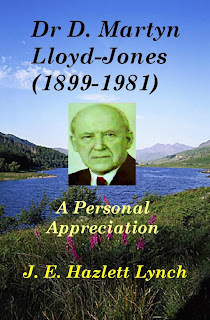For the sake of clarity, let me explain the breakdown of the book. The first half is a narrative of what the doctor's ministry meant to me personally -
and it is a personal reflection and appreciation. The second half is
made up of extracts from his own sermons, over 320 of them, and these
tell us what the Doctor believed about the Gospel and
other Gospel issues. What most people do not know is that DMLJ himself
stated that he never believed in limited atonement, nor did he preach it
("only once on Rom.5:15, and I was in great
difficulty when I did") - nor did the other Dr Lloyd-Jones, his wife, Bethan, so
it is impossible how the impression could possibly be arrived at that he
was, as some describe him, "a committed TULIP Calvinist," whatever that
is.
It
would be profitable if those who seem to be exercised by this matter did as I did and
extracted every statement the Doctor made that indicates that he
believed in limited atonement. This would clear up the matter once and
for all. I wish them well!
Having
neither seen nor read the book, some people have already made up their minds that the book as well as the Doctor's theology/soteriology is unsound. That is regrettable,
because until the contents of the book are actually read and the accuracy of the references checked out
from the original sources, people cannot possibly come to such an
unwarranted conclusion. Basic integrity demands that the book is read first before coming to any conclusion about it's contents.
I
think there is a great tendency within evangelicalism for Christians
not to do their own thinking or to carry out their own research. There
is an incipient Roman Catholicism abroad within reformed evangelicalism
in which Christians simply take as true whatever the "bishops" within that
constituency say is the truth.
So what will this book achieve? It will
provide possibly a stepping stone for evangelicals who are interested in
discovering the truth about what DMLJ believed, taught and preached
about the Gospel's content, and that can only be good for our precious
faith.
I have been appalled at the way reformed evangelicals have resorted to
what could be termed 'dishonesty' to maintain and promote their faith.
The view that confessions can usurp the supreme place in the life of the Church was confirmed in a old edition of the Banner of Truth magazine when the
writer lamented the fact that some reformed men, while affirming that
they held the Scriptures to be the supreme standard of faith and
conduct, and confessional formulations to be subordinate, actually and
in practice made what is subordinate into the supreme. For such men, it
mattered only secondarily what Scripture plainly taught, while what the
confessions said was paramount. This is precisely my position.
I
think reformed evangelicals need to return to the position where in actual fact and
practice the Scriptures are our supreme and only final authority in all
matters of faith and worship, not any man-made formulations.
Confessions have their place, undoubtedly, but they are NOT Scripture.
This was DMLJ's often repeated position, and it's mine, too.
If anyone reading this post wants to review the book, available at this site, I would ask that they check my extracts from DMLJ's own
writings/sermons, my use of which I trust they will find to be accurate, and then
if they disagree with
what the Doctor said, so be it and then say so in their review.

2 comments:
Hazlett. It was good to read your reiteration of the point:
" Confessions have their place, undoubtedly, but they are NOT Scripture."
However, I believe your preoccupation with past teachers - whether DMLJ, Denny, or others, can also be unbalanced.
For example there have been several posts on 'Amyraldus' and Amyraldianism which are of purely academic interest to church historians. Very few Christians in our churches will have even heard of him, let alone to deem important arcane discussions related to 4 or 5 pointCalvinism !
The church is based on the normative doctrine of the apostles and prophets (Eph.4:20), not on past teachers or movements, or confessions of faith, be they never so orthodox and blessed of God in the past.
I suggest therefore that these, and even our "Reformation tradition" must not be made normative, even in our thinking, for then stagnation and complacency is never far away.
(I am not suggesting that you personally are guilty of these! - just making the point)
Thus, whether it is dead Calvinism, or Methodism, or Presbyterianism which is in view, they have no justification for their existence at all apart from the Gospel of Christ.
They served their purpose for their time, and of course we can learn from their experiences, but there are the far more pressing and urgent issues to do with reform of the church TODAY - but not patterned on the past, but rather on what Scripture has to teach us now.
Graham, I don't think we are making any headway in our discussions, because you seem to think, despite your disavowal of it, that I follow men from the past. You seem to follow Zens uncritically. I think we have the privilege of following those who follow Christ, but no further. I cannot bring myself to the point where I arrogantly assume that I can learn nothing from the great men of the past or of the present. What sheer arrogance it would in me to imagine that I have all the truth and that God did not provide teachers in His church to help us all on our way to heaven.
Let us by all means follow those who follow Christ as He is revealed in the Scriptures. They were not in this life by accident, but by the fore-ordination of God. Let us not despise what He has so graciously provided for our learning.
Post a Comment